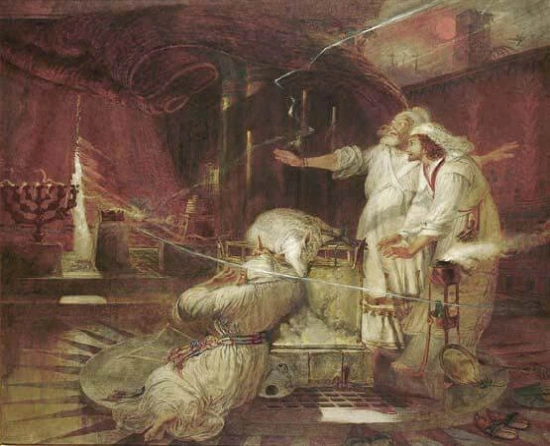10133. 'A continual [offering]' means within all Divine worship. This is clear from the meaning of 'continual', when it refers to such things as belong to Divine worship, as all and within all. For the subject is purification from evils and falsities by means of the good of innocence, this good being meant by 'lambs' and purification from evils and consequent falsities by a burnt offering of them. This is called 'continual' because it must be present in all Divine worship. Therefore also the offering was presented twice each day, in the morning and in the evening; and offerings made morning and evening served in general to represent all worship and what must be present within all worship. The good of innocence must be in all good, and consequently in all truth, if they are to be goodness and truth that have life from the Divine within them, and so it must be within all worship. For all worship, to be worship, must spring from the good of love and from the truths of faith.
All of the Church's and of heaven's good has innocence within it, and without that innocence good is not good, nor therefore is worship worship, see 2736, 2780, 6013, 7840, 7887, 9262.
What innocence is, 3994, 4001, 4797, 5236, 6107, 6765, 7902, 9262, 9936, and the places referred to in 10021 (end).
[2] 'Continual' means all and within all - that is to say, the all of worship, and within all worship - because it is a term that has a temporal connotation and in heaven, where the Word is understood not in the natural but in the spiritual sense, people have no notions of time. Instead of periods of time they perceive the kinds of things that are states. By 'continual' at this point therefore they perceive a perpetual state within worship, thus the all of worship and within all worship. The same applies to all other terms in the Word which have temporal connotations, such as yesterday, today, tomorrow, two days, three days, daily, a week, a month, a year, also times of day and seasons of the year - morning, midday, evening, night, spring, summer, autumn, and winter. Therefore if the spiritual sense of the Word is to be understood, any idea of a period of time acquired from its natural sense, any idea of a place as well, indeed any idea of an actual person must be set aside, and states of things must be conceived of instead. From this it may be seen how perfect the Word is in its internal sense, and so how perfect is the perception of it by the angels in heaven, consequently how much more excellent angels' wisdom and understanding are than the understanding and wisdom of people in the world, who think with solely natural vision focused on the completely finite things of this world and planet. Regarding periods of time in heaven, that they are states, see 1274, 1382, 2625, 2788, 2837, 3254, 3356, 3404, 3827, 4814, 4882, 4901, 4916, 6110, 7218, 7381, 8070; and regarding what states are, 4850.
[3] From all this it is evident what the continual burnt offering of lambs means, and so what 'continual' and 'continually' mean elsewhere, as in the commands that 'the fire shall burn continually on the altar', Leviticus 6:13, and that 'the continual bread shall be on the table', Numbers 4:7. 'The fire' there and 'the bread' mean the good of love received from the Lord and offered back to Him. For 'the fire', that it has this meaning, see 4906, 5215, 6314, 6832, 6834, 6849, 7324, 7852, 10055; and also for 'the bread', 2165, 2177, 3478, 3735, 3813, 4211, 4217, 4735, 4976, 9323, 9545. In those places as well 'continual' means in addition that this good must be present in all worship; and the fact that the same good is the source from which the truth of faith must shine, as if from its fire, is meant by the decree that they were to cause a lamp to go up 1
continually, Exodus 27:20, 'a lamp' being the truth and good of faith, see 9548, 9783.
Notas a pie de página:








